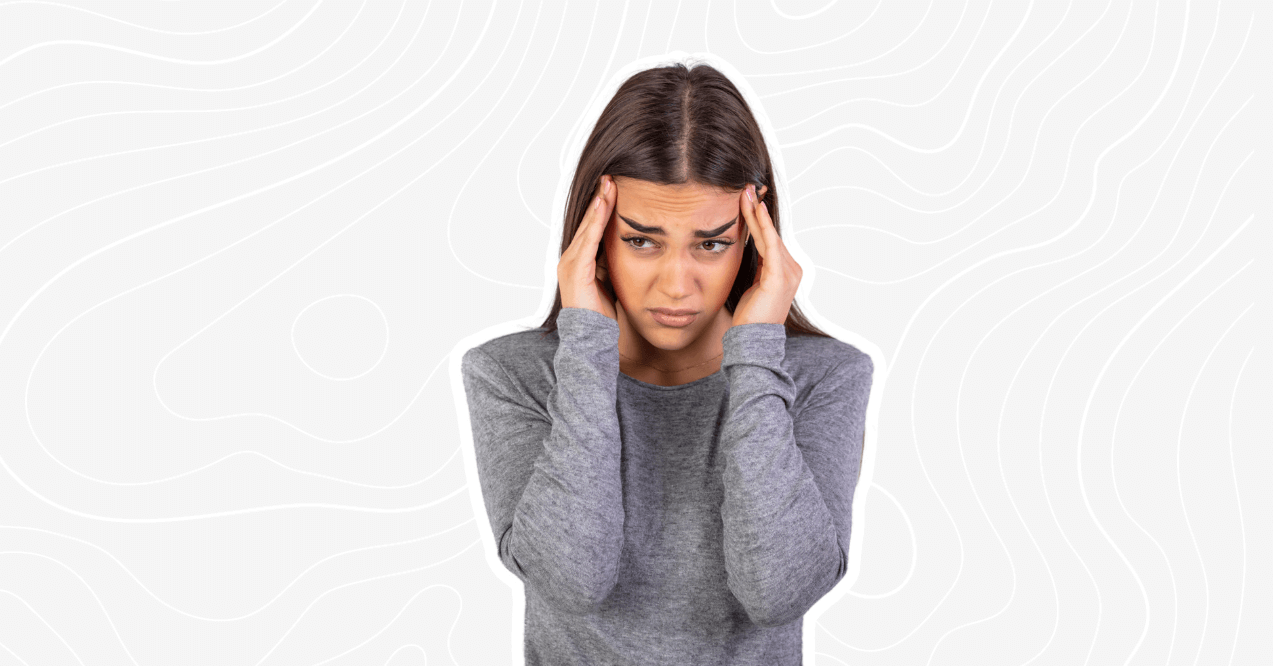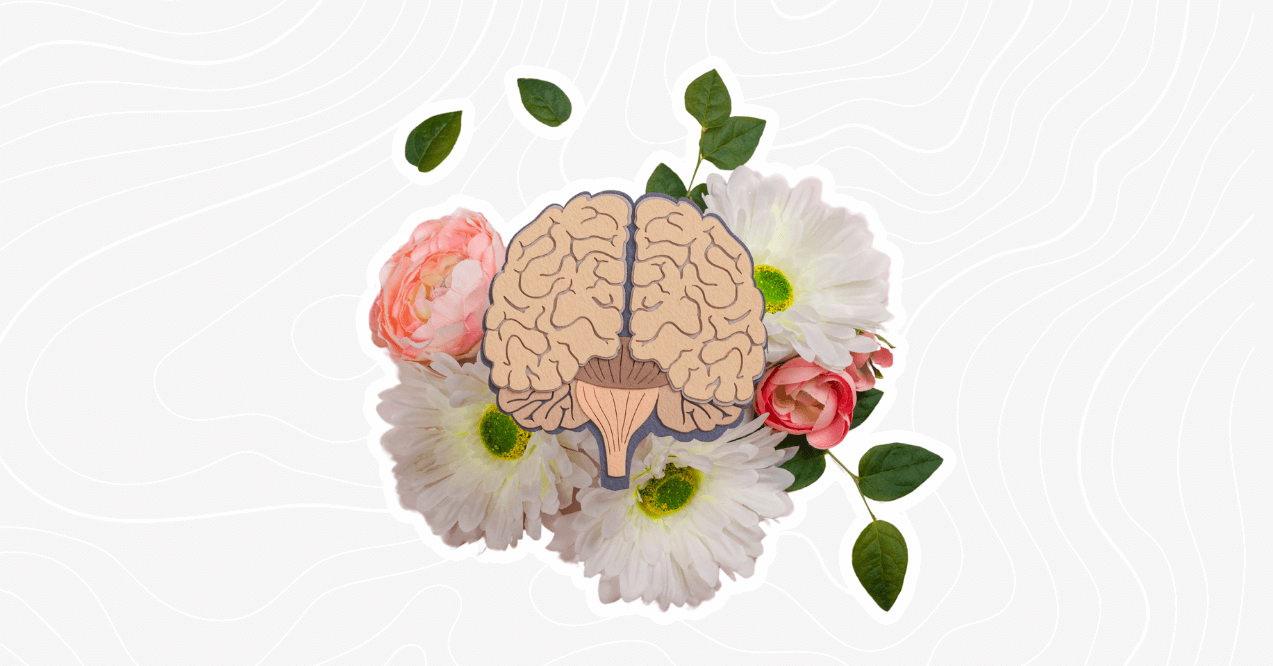Bloated in the Morning Without Eating Much? Causes and Remedies
Waking up feeling bloated in the morning without eating much the night before can be an uncomfortable start to the day. People sometimes think: does coffee make you bloated? Or is it something else? Is it true that kombucha can help with bloating? This sensation is a signal from your body that shouldn’t be ignored and the real reason can differ for everyone.
This article dives deep into the whys and hows of bloating in the morning, shedding light on specific conditions that contribute to this feeling, and lifestyle factors that might be influencing your digestive system. Simple adjustments to your routine, along with using the best supplements for digestion and superfood powders, can make a big difference in reducing discomfort and promoting a healthier gut.
Key Article Findings
Why Am I Bloated in the Morning Without Eating Much?
Understanding what triggers this discomfort is key to managing and potentially alleviating it. By examining our eating patterns, the types of foods we consume, and our lifestyle choices, we can identify factors that contribute to morning bloating. Below you will find all possible reasons and causes that may trigger bloating in the morning.
What Causes Morning Bloating?
Bloating in the morning can perplexingly trace back to the digestive system’s nocturnal activities. As we slumber, our digestive tract is far from resting. It tirelessly processes what we’ve consumed throughout the day. This relentless overnight processing may lead to gas and a bloated sensation come morning, particularly if the digestive system encounters foods that are challenging to break down.
Adding to this, the habit of late-night eating exacerbates the situation by not allowing adequate time for digestion before sleep. This practice may disrupt the natural rhythms of our digestive process, leading to increased discomfort upon waking.
Furthermore, certain food types play a significant role in morning bloating. Foods high in sodium, sugars, or specific carbohydrates may be particularly troublesome for the body to digest efficiently. These culprits are known to contribute to the retention of water and gas, amplifying feelings of bloating.
Common Reasons Behind Morning Bloating
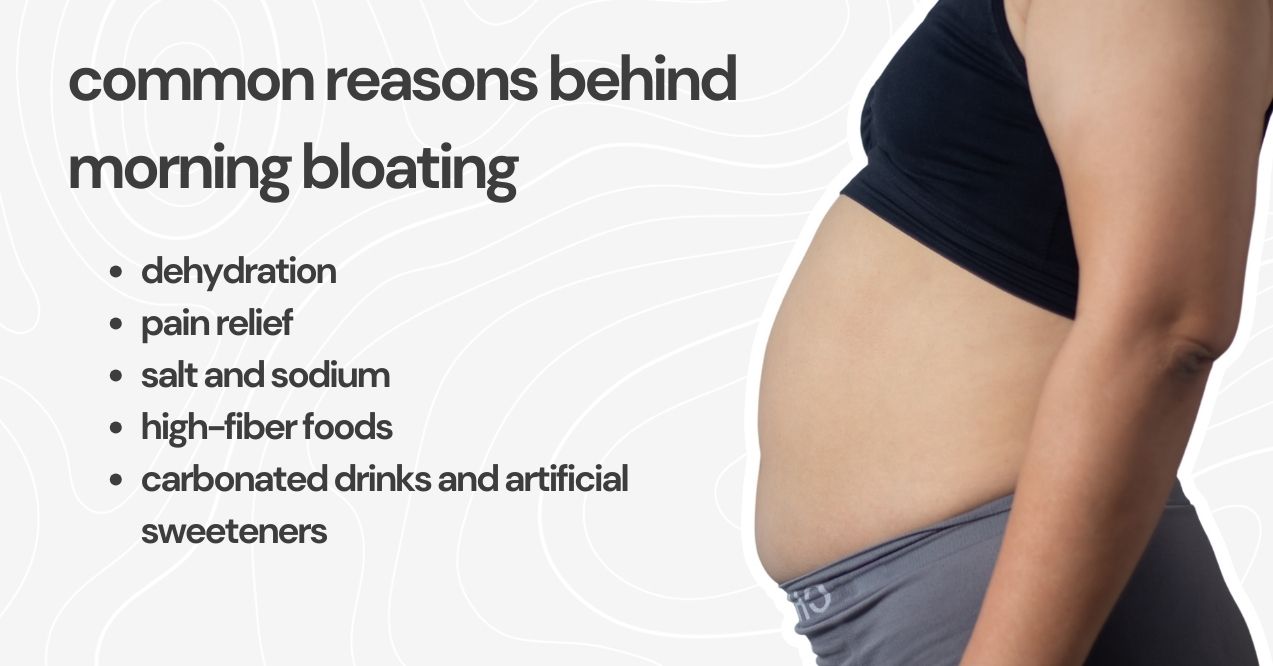
Morning bloating can often feel like an unsolved mystery, yet several common culprits are frequently to blame for this discomfort:
- Dehydration – Surprisingly, not drinking enough water can significantly disrupt your digestion. When dehydrated, the body struggles to process food efficiently, leading to bloating. This can answer the perplexing question of why you might experience bloating after drinking water in the morning.
- Salt and Sodium – These are notorious for their role in water retention, which can make you feel bloated. A high-sodium diet causes the body to hold onto water, attempting to dilute the excess salt, which can result in that all-too-familiar puffy feeling upon waking.
- High-Fiber Foods – While fiber is beneficial for digestion, an abrupt increase in fiber intake can lead to bloating. This is because high-fiber foods can produce significant amounts of gas as they are broken down in the digestive system.
- Carbonated Drinks and Artificial Sweeteners – These can introduce excess gas into your digestive system, leading to bloating. Furthermore, some artificial sweeteners are not easily digested, contributing to discomfort.
Does creatine make you bloated? Specific lifestyle choices can also influence bloating. Creatine can draw water into your muscles, affecting overall water distribution and potentially leading to bloating.
Similarly, does lack of sleep cause bloating? Yes, inadequate rest may disrupt the digestive process, contributing to bloating issues.

Specific Conditions Contributing to Morning Bloating
Digestive Disorders and Morning Bloating
- Heartburn – These conditions occur when stomach acid flows back into the esophagus, causing irritation. Individuals may experience pain in the stomach early morning due to overnight acid buildup and reflux, contributing to bloating and discomfort upon waking.
- Constipation – A condition characterized by infrequent bowel movements or difficulty passing stools. Constipation can lead to bloating and discomfort, as the buildup of waste materials affects gas production and gut health. Relief strategies include increased fiber intake, hydration, and physical activity to stimulate digestion.
Food Intolerances and Allergies
- Lactose Intolerance – This condition results from the body’s inability to digest lactose, a sugar found in milk and dairy products. Consumption of these products may lead to bloating, gas, and abdominal discomfort, often more pronounced in the morning after overnight digestion.
- Gluten Sensitivity – Individuals with gluten sensitivity experience adverse reactions to gluten, a protein in wheat, barley, and rye. Symptoms include bloating, gas, and diarrhea, which can occur after consuming gluten-containing foods, leading to morning discomfort.
- Other Common Food Sensitivities – Beyond lactose and gluten, sensitivities to foods like certain fruits, vegetables, and artificial sweeteners may trigger bloating. These sensitivities cause the digestive system to produce excess gas or retain water, contributing to a bloated feeling upon waking.
Lifestyle Factors Influencing Morning Bloating
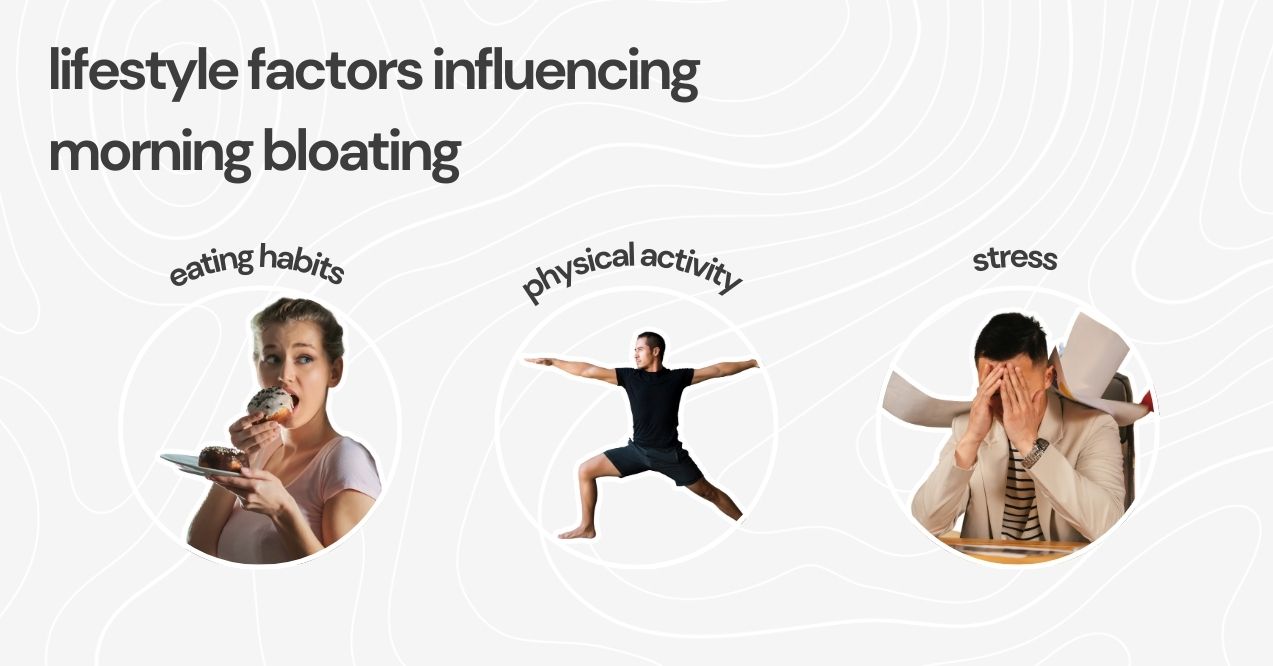
Eating Habits and Their Impact
- The Effect of Late-Night Snacking – Eating close to bedtime can disrupt the digestive process, leading to incomplete digestion by morning. This can cause increased bloating and discomfort due to the body struggling to digest food while lying down, exacerbating gas production and retention.
- The Importance of Meal Timing and Frequency – Regular, well-spaced meals support more consistent digestive activity, reducing the likelihood of bloating. Erratic meal times or infrequent, large meals can overwhelm the digestive system, leading to gas buildup and bloating. Establishing a routine eating schedule helps maintain optimal digestive function, minimizing morning bloating.
The Role of Physical Activity
- Regular exercise stimulates the gastrointestinal tract, promoting more efficient digestion and gas movement through the system. This may reduce the incidence of bloating by preventing gas buildup and facilitating smoother digestion processes.
- Recommended Physical Activity – Gentle, low-impact exercises such as walking, yoga, and swimming are particularly beneficial for reducing bloating.
These activities enhance circulation and digestive function without overstressing the body, helping to release trapped gas and alleviate discomfort associated with bloating. Incorporating consistent, moderate exercise into your routine can be a key factor in managing and reducing bloating symptoms.
Stress and Bloating
- Stress can significantly alter gut function and balance, leading to increased sensitivity and reduced digestive efficiency. This disruption often results in bloating, as stress hampers the body’s ability to process and eliminate gas effectively.
- Implementing stress-reduction techniques such as mindfulness meditation, deep breathing exercises, and regular physical activity can help manage stress levels, thereby improving digestive health and reducing bloating. These practices aid in relaxing the gastrointestinal tract, enhancing digestion, and preventing the stress-induced bloating that many experience.
Dietary Changes to Manage Morning Bloating
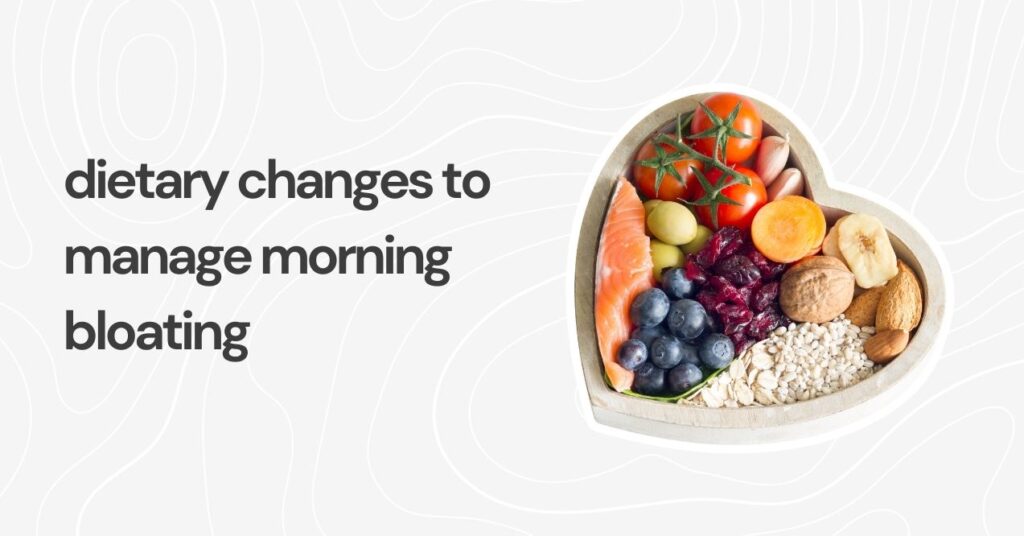
Foods to Avoid
- Processed Meats – Items like sausages, bacon, and deli meats are high in sodium and preservatives, leading to water retention and bloating.
- Soft Drinks – The carbonation in sodas and similar beverages introduces excess gas into the digestive system.
- Broccoli and Cabbage – While healthy, these vegetables are high in raffinose, a sugar that remains undigested until fermentation in the gut, producing gas.
- Beans – Rich in fibers and oligosaccharides, beans can cause gas and bloating in some individuals.
- Wheat Bread – For those with gluten sensitivities, wheat-based products can cause pro-inflammatory activity and bloating.
- Dairy Products Like Milk and Cheese – Lactose can be difficult to digest for those with lactose intolerance, leading to bloating.
Foods to Embrace
Probiotics are beneficial bacteria that play a critical role in maintaining gut health and improving digestion. They can help restore the balance of gut flora, which is essential for effective digestion and can significantly reduce symptoms of bloating. Including fermented foods like yogurt, kefir, and sauerkraut in your diet, or taking a probiotic supplement, can be beneficial.
This leads to the question, do probiotics help with bloating? The answer is yes, as they support gut flora balance and digestion, reducing gas production and discomfort.
Drinking enough water is essential for preventing bloating. Proper hydration helps the digestive system run smoothly, facilitating the breakdown and passage of food. It also prevents constipation, which is a common cause of bloating. Aim to drink at least 8 glasses of water a day, and consider starting your morning with a glass of water to kickstart your digestion.
A diet high in fiber aids in regular bowel movements, which is key to reducing bloating. Fiber helps to keep the digestive system moving and prevents constipation. However, increase fiber intake gradually to allow your digestive system to adjust without causing additional bloating. Foods rich in fiber include fruits, vegetables, whole grains, and legumes.
Some supplements might support digestive health and help manage bloating. For example, Trumeta Metabolic Reds contain a blend of natural ingredients like beetroot, berries, and other red fruits rich in antioxidants, which may support metabolism and optimize digestive health. These ingredients help to manage bloating by promoting healthy digestion and nutrient absorption. Incorporating such supplements, alongside a balanced diet, can enhance digestive efficiency and mitigate bloating.

Solutions for Morning Bloating
Natural Remedies
- Herbal teas are renowned for their digestive benefits, with specific varieties earning the title of the best tea for bloating. Peppermint tea, for instance, relaxes the digestive tract and can reduce bloating symptoms. Ginger tea aids in speeding up digestion, reducing the likelihood of gas buildup. These teas serve as soothing remedies and can be considered the best morning drink for bloating, providing relief and promoting digestive health from the start of the day.
- Digestive enzymes play a crucial role in breaking down foods, making nutrients more accessible and reducing the risk of gas and bloating. Kombucha, a fermented tea rich in natural enzymes and probiotics, has been questioned for its benefits: does kombucha help with bloating? The answer is yes. Its enzymatic content supports the breakdown of complex molecules, aiding in digestion and preventing common issues like bloating after drinking water in the morning.
Lifestyle Modifications
Incorporating low-impact exercises such as walking, yoga, and pilates into your daily routine can stimulate gut motility and aid in gas expulsion, reducing bloating. A 10 to 15-minute walk post-meals is especially beneficial in enhancing digestion and preventing gas accumulation.
Since stress can significantly impact digestive health, leading to increased bloating, adopting stress-reduction practices is crucial.
Techniques like deep breathing exercises, mindfulness meditation, and progressive muscle relaxation can lower stress levels, thereby mitigating its adverse effects on digestion. Regular engagement in these practices helps in calming the nervous system, which in turn supports healthier digestive processes and reduces the occurrence of morning bloating.
When to Consult a Healthcare Professional

Consulting a healthcare professional is crucial when morning bloating is persistent, severe, or accompanied by other symptoms indicating a deeper health issue.
Signs that warrant a doctor’s visit include:
- Bloating that doesn’t improve with dietary or lifestyle changes
- Significant weight loss
- Continuous pain in stomach early morning and discomfort throughout the day
These symptoms could signal underlying conditions such as food intolerances, or even more serious gastrointestinal disorders.
During the consultation, expect a detailed discussion about your symptoms, dietary habits, lifestyle, and any recent changes in your health. The doctor may conduct a physical examination and suggest diagnostic tests, such as blood tests or imaging studies, to identify the cause of your bloating.
Be prepared to provide a comprehensive overview of your symptoms and their impact on your daily life. This information will help your healthcare provider develop an effective treatment plan tailored to your specific needs, addressing both the symptoms and the underlying causes of your bloating.
Takeaway
- Morning bloating signals the body’s struggle with overnight food processing, exacerbated by late-night eating and certain foods like those high in sodium, sugars, or specific carbohydrates.
- Dehydration, salt and sodium intake, and carbonated drinks contribute to bloating by disrupting digestion or causing water retention.
- Digestive disorders can cause morning discomfort. Strategies like increased fiber, hydration, and physical activity are recommended for relief.
- Food intolerances and allergies, especially to lactose and gluten, play a significant role in morning bloating.
- Eating habits, including late-night snacking and irregular meal timing, impact bloating. Well-spaced, regular meals help maintain digestive function.
- Physical activity, particularly low-impact exercises like walking, yoga, and swimming, stimulates digestion and reduces bloating.
- Stress affects digestive health, increasing bloating. Techniques like meditation, deep breathing, and regular exercise can manage stress levels.
- Dietary changes to avoid foods known to trigger bloating include processed meats, soft drinks, and high-raffinose vegetables. Embracing probiotics, proper hydration, and high-fiber foods is beneficial.
- Natural remedies like herbal teas and digestive enzymes, including kombucha, offer relief. The best morning drink for bloating is herbal tea.
- Consult a healthcare professional if bloating is persistent, severe, or accompanies symptoms like significant weight loss or continuous pain, which could indicate underlying conditions.
yes, lack of sleep can cause bloating in the morning. Insufficient rest disrupts the body’s natural digestive processes and hormonal balance, leading to slowed digestion and increased gas production. This disruption can result in bloating, highlighting the importance of regular, quality sleep for maintaining optimal digestive health and preventing bloating.
waking up bloated and gassy every morning can result from factors like late-night eating, consuming bloating-inducing foods (e.g., high sodium, carbonated drinks), digestive disorders, food intolerances, and even stress or lack of sleep, which disrupt normal digestive processes and gas production.
feeling bloated after drinking water in the morning can occur if your digestive system is slow to wake up, leading to temporary water retention. Additionally, overnight dehydration can cause your body to hold onto water more aggressively when you rehydrate, contributing to a bloated sensation.
Advertisement. This site offers health, wellness, fitness and nutritional information and is designed for educational purposes only. You should not rely on this information as a substitute for, nor does it replace, professional medical advice, diagnosis, or treatment. If you have any concerns or questions about your health, you should always consult with a physician or other health-care professional. Do not disregard, avoid or delay obtaining medical or health related advice from your health-care professional because of something you may have read on this site. The use of any information provided on this site is solely at your own risk.


